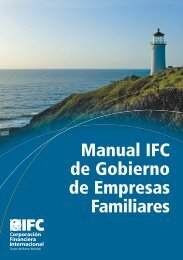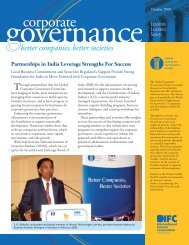Corporate Governance for Banks in Southeast Europe: Policy - IFC
Corporate Governance for Banks in Southeast Europe: Policy - IFC
Corporate Governance for Banks in Southeast Europe: Policy - IFC
You also want an ePaper? Increase the reach of your titles
YUMPU automatically turns print PDFs into web optimized ePapers that Google loves.
The value of <strong>in</strong>dependence: The value of an <strong>in</strong>dependent view of bank affairs needs to be bettercommunicated. Independent board members br<strong>in</strong>g fresh ideas and <strong>in</strong>crease objectivity. Some level of<strong>in</strong>dependence will benefit <strong>in</strong>dependence-m<strong>in</strong>ded owners of closely held banks. Independent board memberscan also demonstrate commitment to depositors and other stakeholders and help <strong>in</strong>still trust.Qualifications of <strong>in</strong>dependent board members: Independent board members need to br<strong>in</strong>g needed skillsto the bank. If <strong>in</strong>dependent board members are to sit on board committees, they should be required to havespecific expertise and background to effectively fulfill their responsibilities. Job descriptions <strong>for</strong> <strong>in</strong>dependentboard members would help def<strong>in</strong>e the required background.Def<strong>in</strong>itions of <strong>in</strong>dependence: Better and more simple def<strong>in</strong>itions of <strong>in</strong>dependence are required. Currentdef<strong>in</strong>itions are long checklists of negative characteristics that disqualify a board member from be<strong>in</strong>g labeledas <strong>in</strong>dependent. Checklists are often popular with supervisors, because they are simple to use. Althoughchecklists ensure consideration of a certa<strong>in</strong> number of key factors, they are poor at flush<strong>in</strong>g out importantqualitative factors. Def<strong>in</strong>itions should describe the qualities that are needed and not just those that are to beavoided. An overly narrow and negative def<strong>in</strong>ition of <strong>in</strong>dependence can result not only <strong>in</strong> the selection ofpoor board members but also <strong>in</strong> the loss of valuable talent.The Basel Committee provides a simple work<strong>in</strong>g def<strong>in</strong>ition of <strong>in</strong>dependence: “The key characteristic of<strong>in</strong>dependence is the ability to exercise objective, <strong>in</strong>dependent judgment after fair consideration of all relevant<strong>in</strong><strong>for</strong>mation and views without undue <strong>in</strong>fluence from executives or from <strong>in</strong>appropriate external parties or<strong>in</strong>terests.” Furthermore, the Basel Committee task <strong>for</strong>ce <strong>for</strong> the new corporate governance pr<strong>in</strong>ciples hasreduced emphasis on prescrib<strong>in</strong>g <strong>in</strong>dependence <strong>for</strong> <strong>in</strong>dividual <strong>in</strong>dependent board members and focusedmore on ensur<strong>in</strong>g that the collective board is objective, qualified, and so on, thus allow<strong>in</strong>g a good mix ofexperience as well as <strong>in</strong>clusion of <strong>in</strong>dividuals that may not meet the letter of the <strong>in</strong>dependence def<strong>in</strong>ition.Lett<strong>in</strong>g the markets decide on <strong>in</strong>dependence: Competitive pressures should be allowed to createdemand <strong>for</strong> <strong>in</strong>dependence. However, sometimes board members may be threatened by or afraid of change.So a m<strong>in</strong>imum of <strong>in</strong>dependent board members may need to be legislated to get the idea started. The numberof <strong>in</strong>dependent board members should be disclosed to allow the public to assess the potential risks associatedwith an absence of <strong>in</strong>dependence.Independence on boards of subsidiaries: It is not desirable to prevent owners of wholly owned <strong>for</strong>eignsubsidiaries from determ<strong>in</strong><strong>in</strong>g the specific composition of their supervisory boards, though some levelof <strong>in</strong>dependence on the boards of <strong>for</strong>eign subsidiaries is considered to be beneficial. The committees ofsubsidiary boards, <strong>in</strong> particular the audit committee, could benefit from the presence of <strong>in</strong>dependent boardmembers. Consideration should be given to mandat<strong>in</strong>g a m<strong>in</strong>imum level of <strong>in</strong>dependent board members <strong>for</strong>subsidiary boards. This may be particularly important if the <strong>for</strong>eign subsidiary is among the top banks with<strong>in</strong>the country.22<strong>Policy</strong> Brief<strong>Corporate</strong> <strong>Governance</strong> <strong>for</strong> <strong>Banks</strong> <strong>in</strong> <strong>Southeast</strong> <strong>Europe</strong>



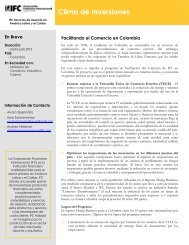
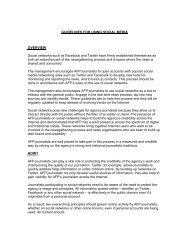
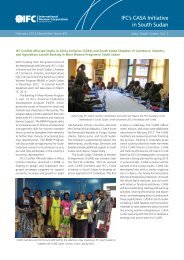
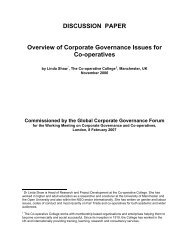
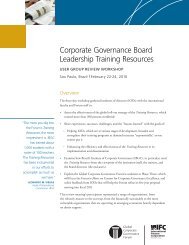

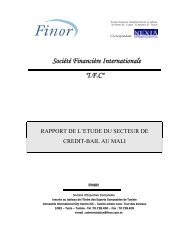
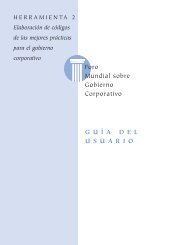

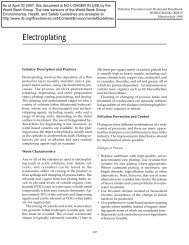
![Print a two-page fact sheet on this project [PDF] - IFC](https://img.yumpu.com/43449799/1/190x245/print-a-two-page-fact-sheet-on-this-project-pdf-ifc.jpg?quality=85)
